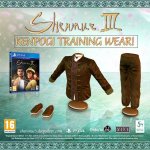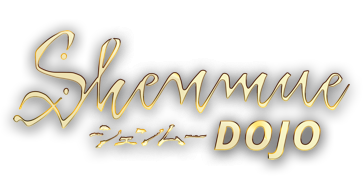- Joined
- Oct 3, 2019
ryo's green karate one. Is it in the game? Or is it with one of the special editions ofr something? Yu always teased it being in but I have only come across a black version that's unbuttoned.
Koch media calls it an kenpogi outfit.Not to nitpick but thats not a 'karate' uniform.
At best its a kung fu one. Or just traditional 'coolie' outfit from 19th century China.
Anyways I thought this thread initially was going to talk about the black one and its expensive pricing.
Or that one Yokosuka jacket for 137,000 tokens lol

Koch media calls it an kenpogi outfit. View attachment 5955
"着" could just mean "outfit". So if you put "拳法" and "着" together, it simply means "Kung Fu outfit".yeah...Kenpo gi. (interesting if you google the term 'kenpogi' without a space in between, you get nothing but Final Fantasy links and references)
Gi - a traditional Japanese term for martial arts training uniform typically used in Japanese martial arts such as Karate, Jujutsu, Judo, Aikido.
Kenpo - an older term for Chinese martial arts
The Origin of Kenpo Karate. Kenpo/Kempo is a Japanese unarmed fighting art that was brought from China to Japan about 700 years ago by the Yoshida Clan and was quickly adopted by the Komatsu Clan. The word Kenpo means literally, "Fist Law," and also refers to its Chinese origin. Some Kenpo Karate schools even reference themselves as "Shaolin Kenpo" despite it being Japanese. Kenpo karate is basically a Japanese adaptation which also incorporates Karate, boxing and Jujutsu besides its roots of Chinese martial arts from Shaolin.
A traditional Kenpo Karate gi looks just like a normal tradtional Japanese Karate / Judo / Jujitsu gi. Which....looks nothing like that. This is what Kenpo Karate users wear (Karate gi / uniforms)
Chinese Kenpo, also known as Chinese Kung Fu, or Chinese Martial Arts is a fighting style used by many martial artists. It is a diverse martial art as it possesses many different forms and styles, and is used a basis for many other forms of martial arts as well.
I don't believe the Chinese use the term "gi" which is what threw me off. Thats a Japanese word. And nowadays people either use the term "Kung Fu" (in Hong Kong and the West), or "Wushu" (in mainland China). The term "Chinese Kenpo" is not frequently used anymore, and traditional Kung Fu schools do not wear karate uniforms. They wear what is shown in that Shenmue ad you linked: a kung fu/Wushu uniform.
I suppose since Shenmue is after all a Japanese product made by mostly Japanese (and some Western help), the terms 'Kempo' and 'gi' are used.
Same as why in the past, SEGA, when using the Chinese martial art Bajiquan for Akira Yuki in Virtua Fighter series, would instead reference it by its Japanese translated term: Hakkyoku-ken, which is the Japanese translation for Bājíquán (八極拳; meaning "Eight Extremities Fist")
And in Japan, when they practice Bajiquan, they wear a traditional Karate gi with a karate belt mostly. (of course in Virtua Fighter, you see that Akira's VF2 default and his VF5 2P outfits are more Chinese design than his traditional Japanese white or black Karate gi but he mostly wears a karate belt)
"着" could just mean "outfit". So if you put "拳法" and "着" together, it simply means "Kung Fu outfit".
"Hakkyoku-ken" (はっきょくけん) is just the way Japanese pronounce the Chinese characters "八極拳" (which is pronounced as Bājíquán in Chinese) in their language. Just like in S3 they would pronounce "Niaowu" (鳥舞) as "Chobu" (チョブ), "Nanquan" (南拳) as "Nanken" (なんけん).
It is all about pronunciation since the kanji characters for those words in Chinese and Japanese are the same. Whether it's pronounced as Bajiquan or Hakkyokuken, it's written as 八極拳 in both Chinese and Japanese. I don't see anything translated.you mean 'translate'. Pronounce is pronounce. Translate is translate.
It is all about pronunciation since the kanji characters for those words in Chinese and Japanese are the same. Whether it's pronounced as Bajiquan or Hakkyokuken, it's written as 八極拳 in both Chinese and Japanese. I don't see anything translated.
"音読み (onyomi), which literally means "sound reading", is the Chinese reading of kanji. 訓読み (kunyomi), on the other hand, is the Japanese reading of kanji."no its still translation, not pronunciation. It doesn't matter the kanji is the same. Pronunciation would be if the Japanese were trying to verbally pronounce say a word like 'quan' (fist) in their phonetic vernacular. Instead, they just use their Japanese verbal translation for 'fist' which is 'ken'.
Now pronunciation would be if the Japanese, let's say. were trying to pronounce the English/German word: hamburger. They would use their phonetic verbal pronunciation ハンバーガー Hanbāgā.
Which is a foreign word. However, 'fist' is not a foreign word, so hence them just translating 'quan' to 'ken'.
"音読み (onyomi), which literally means "sound reading", is the Chinese reading of kanji. 訓読み (kunyomi), on the other hand, is the Japanese reading of kanji."
And "Ken" (ケン) is the onyomi reading for kanji "拳". The kunyomi reading for "拳" is "こぶし" (kobushi).
